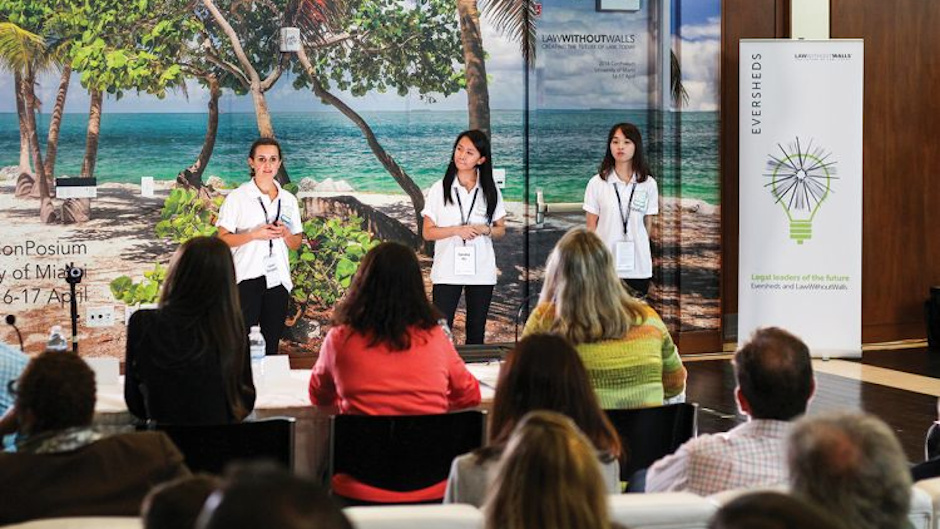Teams of graduate law and business students from around the world presented legal projects that they worked on over the course of four months for the LawWithoutWalls “ConPosium” this past weekend at University of Miami’s Newman Alumni Center. LawWithoutWalls, an innovative program launched at Miami Law, is now in its sixth year.
The 50 students, from as far away as China, Australia, South Africa, and South America, first met in Madrid, Spain in January. Last year’s program kicked off in Dublin. At this initial meeting, students brainstormed practical innovations to address problems in law in preparation for their presentations before a multidisciplinary panel of judges.
The teams spent the spring back in their respective home countries, and collaborated through weekly video calls and conferencing.
Eight of the 18 teams were selected by the panel as finalists and the overall winners were voted on by participants. The team that took first overall called their innovation “VIDE,” with Courtney Rickersey from Griffith University in Australia, Carolina van der Mensbrugghee from Fordham Law School, and Aina Cordero, a Spaniard who is attending the Universität St. Gallen in Switzerland.
The VIDE team discovered that humanizing defendants in legal cases with tools such as short video biographies had a great influence in sentencing outcomes. They drew inspiration from Silicon Valley De-Bug, a California-based communications company that, according to Courtney of team VIDE has saved defendants over 2,570 years imprisonment and California over $160 million in incarceration costs over seven years by profiling defendants with video biographies.
“We came up with an app idea to democratize video biography and other media capabilities through an application that gives attorneys instructions on how to craft the best legal defense,” said van der Mensbrugghee.
“I didn’t expect us to win overall, I’m really happy,” said Cordero.
“We’re all from different countries and we have different legal systems but we’re really united about this cause and helping this issue,” van der Mensbrugghee added.
Another team was a European trio whose innovation was called “Caspecto.”
Caspecto uses artificial intelligence to analyze variables that characterize a particular legal question (like slipping on a banana peel in a grocery store, for example) and compares them to a pool of past legal cases, generating a report with such information as the likelihood of winning and the compensation one may get.
“It’s reducing the uncertainty you feel when you have an accident or any issue that may be worthy of bringing to court, it tells you what are your real chances, in practice, based on what has happened before in court,” said Santiago Menéndez, from IE University in Segovia, Spain. “It helps you a make a very informed decision.”
"With Caspecto, you actually can see if you should go and talk to a lawyer,” said Andri Björgvin Arnthorsson, a team member studying business law at Bifröst University in Iceland. “The likelihood of succeeding might be 30% … it probably won’t pay off so you don’t have to go through the hassle and you don’t have to think about it anymore … Or, if you’re in the higher end of the grey area, maybe 70%, then you can take that case to a lawyer … and find the best way to succeed. Simple, easy, and effective.”
A large factor in the team’s success came from their unity, according to Göktuğ Gürbüz, from Universität St. Gallen, and the third member of the team.
“Everybody should know everything about the project so that we can stand in front of the jury as a group. That’s why we always worked together in every step of the proceedings.” Gürbüz lives in Switzerland but is of Turkish descent.
The word “Caspecto” comes from a combination of the words “case” and the latin word “specto” meaning “to expect;” that is, Caspecto tells potential litigants what they can expect in a law case.
Another team presented an innovative privacy application called “Photoguard.” The dynamic group with members from Australia and China developed a software platform that uses image recognition software to detect nude images and protect social media users from potential backlash.
“Our goal is to educate, prevent, and protect,” said University of Miami Law student Lauren Georgalas of team Photoguard. Photoguard won first place for creativity out of the 18 teams competing.
The conference had a host of big-name project sponsors including Microsoft, Lockheed Martin, LegalZoom, and Diversity Lab.
This story was adapted from the original published in The Miami Hurricane, the student newspaper of the University of Miami.

